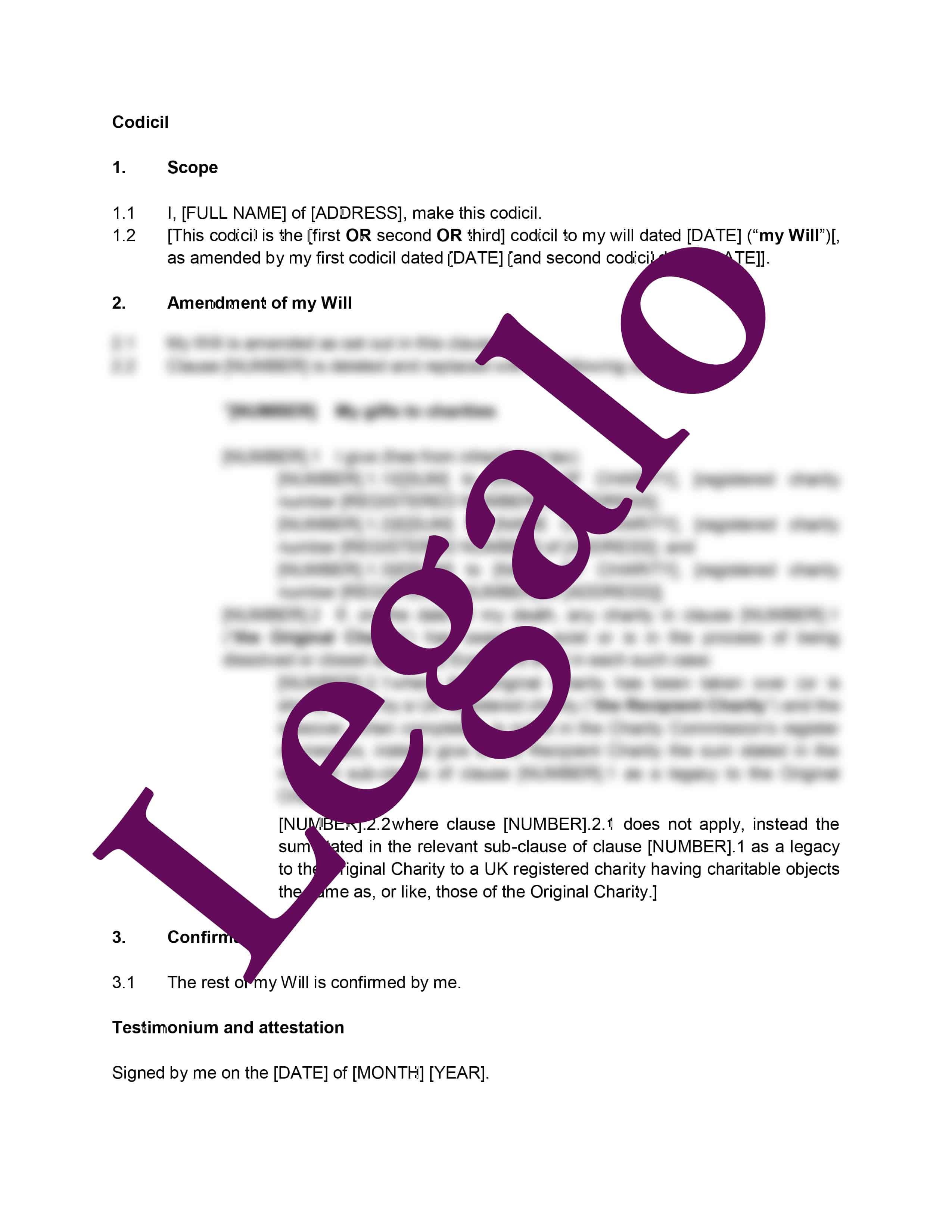Codicil to Leave Gift To Charity
Our Codicil to Leave Gift To Charity template:
- Pre edited for leaving a charitable gift
- Lawyer drafted for reliability
- Written in clear, plan English

How Does It Work?
-
1. Download
-
2. Edit
-
3. Print
-
4. Sign
This Codicil to Leave Gift To Charity template is a version of our general codicil template. We have pre-edited it for you, to make provision for your leaving a new gift to a charity.
Amending your Will is easy with our Codicil
If you need to amend your will because you have decided to leave a new gift to a charity, then a codicil is an easy way to amend the will. There is no need to create a whole new will, as a codicil operates to amend your existing will legally and validly.
One of our co-founding solicitors has written this template. It is suitable for use with any UK last Will and Testament (so England, Wales, Northern Ireland and Scotland). It is a variation of our general codicil template. That template has not been pre-edited to cover any specific changes to a will, but covers making new gifts to charities, appointing additional or replacement executors and other matters. Please click on the above link if you need the general codicil in order to make other changes.
Using our Codicil to Leave Gift To Charity template
A codicil is ideally used when you are going to make just one change to your will. If you just want to amend the will to leave a charitable gift, then do use this template. If you want to make multiple changes, then instead we suggest you use the standard codicil template.
Once you have edited the template to suit your needs, then print it off and very carefully follow the signing instructions that are in the guide that accompanies the codicil template. It is important that you sign it correctly so that it is valid.
If you would like to preview our written guide to the standard codicil, then please click on this link and scroll down to the section about the guide.
Should I make a new Will instead?
If however you intend to make extensive changes to your will, then we recommend that you create a new will, rather than use this codicil to leave gift to charity. With any of our Will templates, you can do that in just a few minutes. You can find our full range of Wills here: click on this link. We are sure there will be a will template there to suit you.
If the history of Codicils interests you, then see Wikipedia.
FAQs on Codicils To Leave a gift to Charity
Below, we have answered the top questions from the Internet on this type of Codicil.
How do I leave money to charity in a will?
To leave money to a charity in your will is very simple. You can specify the particular charitable organisation you would like to donate to, along with the amount or percentage of your estate that you wish to allocate for this purpose. You can also include any specific instructions or conditions regarding the charitable donation within your will document.
If you already have an existing will and wish to make changes related to your charitable donations, you may consider using a codicil. A codicil is a legal document that allows you to make amendments or additions to your existing will without having to create an entirely new will.
Do I need a solicitor to add a codicil to my will?
When you use a great template as your starting point, there is no need to involve a solicitor when adding a codicil to your will. So use Legalo’s codicil template, which comes with a full written guide to make the job simple for you.
How do I leave a charity bequest?
When planning to leave a charity bequest, you should do the following:
- Choose a charity: Select the charitable organisation or cause that you wish to support with your bequest. Consider causes that align with your values and have a positive impact.
- Specify in your will: Clearly state in your will the specific amount or percentage of your estate that you want to leave to the charity. Be as clear as possible, to avoid any ambiguity.
- Include charity details: Provide complete and accurate information about the chosen charity, including its full name, address, and registered charity number. This ensures that the funds are directed to the intended organisation.
- Regularly review and update: It’s important to periodically review and update your will, including any charitable donations. This allows you to reflect any changes in your charitable wishes and ensure that your will accurately represents your intentions.
How do you leave a gift in a will?
When planning to leave a gift in your will, follow these steps:
- Identify beneficiaries: Determine who you want to be the recipients of your gifts or assets. This can include family members, friends, or charitable organisations.
- Specify the gift: Clearly state in your will what you intend to leave behind, whether it’s money, property, personal belongings, or any other assets. Be specific to avoid any confusion or disputes.
- Name an executor: Appoint a trusted individual or two as the executor(s) of your will. These people will be responsible for carrying out your wishes and ensuring that your estate is distributed according to your instructions.
- Sign and witness: Sign your will in the presence of 2 witnesses, as required by law. This helps to ensure its authenticity and validity.
- Store securely: Keep your will in a safe and secure location, such as a locked safe or with a trusted legal professional. Inform a reliable person about the whereabouts of your will, so it can be easily located when needed. The government’s secure facility is a great solution for storing a will and/or codicil for a very fair price. Click here for details.
Does leaving money to charity reduce Inheritance Tax?
In the UK, leaving money to charity in your will can provide tax benefits by reducing Inheritance Tax. When you allocate at least 10% of your estate to a charitable cause, it may qualify for the “charitable bequest exemption.” By including a charitable bequest of 10% or more in your will, the rate of Inheritance Tax applied to the taxable portion of your estate will decrease from 40% to 36%. This reduction can help maximise the amount of money that goes to both charities and your heirs. This is a tax-efficient way to support charitable causes while reducing the tax burden on your estate. It allows you to contribute to the betterment of society, while benefiting from tax savings.
How much do you need to leave to charity to reduce Inheritance Tax?
In the UK, if you wish to reduce Inheritance Tax through a charitable bequest, as an example if you leave 10% of your net estate to charity in your will, your Inheritance Tax rate is effectively reduced to 36% on the overall taxable estate, instead of the standard rate of 40%. This can result in significant tax savings for your estate, allowing more assets to be distributed to both charitable causes and your beneficiaries.
Effectively, any gift left to charity is exempt from Inheritance Tax, and the remaining estate is taxed at the usual rate of tax.
Is a gift to charity a potentially exempt transfer?
In the UK, it’s important to note that a gift to charity made during your lifetime is typically not classified as a “potentially exempt transfer” (PET) in the context of Inheritance Tax. The term PET refers to gifts made to individuals, which become exempt from tax if the donor survives for at least seven years after making the gift. Unlike gifts to individuals, charitable donations are immediately exempt from Inheritance Tax. This exemption applies regardless of whether the donor survives for seven years or not.
A gift to a charity left in your will reduces the value of your estate for Inheritance Tax purposes. This means there is no Inheritance Tax on the amount of the gift to the charity.
What are the benefits of leaving money to charity?
There are several benefits to leaving money to charity in your will:
- Tax Reduction: Any money left to charity by your will reduces your estate’s liability to Inheritance Tax in the UK. This results in potential tax savings for your estate.
- Legacy of Giving: Leaving a charitable gift in your will allows you to support causes that are dear to your heart and create a lasting philanthropic legacy. It ensures that your values and commitment to charitable giving continue even after you’re gone.
- Positive Impact: Your gift to charity can have a significant impact on the community or the charitable organisation you choose to support. It can help fund vital programs, research, or initiatives that make a difference in the lives of others.
- Personal Satisfaction: Contributing to a greater good and knowing that your gift will have a positive impact can bring personal satisfaction and fulfilment. It allows you to leave a meaningful legacy that aligns with your values and beliefs.
What is a codicil?
A codicil is a legal document that functions as an amendment or addition to an existing will. It enables you to make specific changes to your will without having to rewrite the entire document. To be legally valid, a codicil must meet the same requirements as a will. This includes:
- being in writing;
- signed by the testator (the person making the codicil); and
- witnessed by 2 adults.
Can I make a codicil myself?
Yes, it is possible to create a simple codicil yourself. To make it easy for you to do this, without needing to pay an expensive solicitor, here’s a step-by-step guide to creating a codicil:
- Document the Changes: Begin by writing down the specific changes you wish to make to your existing will. Clearly state the amendments or additions you want to incorporate. Avoid ambiguous language.
- Signing and Dating: Sign and date the codicil document to indicate your approval of the changes – only sign it in the presence of 2 adult witnesses. This step is crucial for validating the codicil.
- Witnessing: Have the codicil witnessed by at least two individuals who are not beneficiaries named in the will or codicil. The witnesses should be present during the signing process and must sign the document as well. This helps ensure the legality of the codicil.
How much does a solicitor charge for a codicil?
The cost of engaging a solicitor to assist with a codicil can vary depending on several factors. These factors include the complexity of the changes you wish to make and the fees charged by the solicitor. While a straightforward codicil may cost a couple of hundred pounds, more intricate modifications could result in higher fees.
You can make a substantial saving by downloading a template from Legalo, with which you can create your own codicil, safe in the knowledge that the template was drafted by a legal professional.
Can a codicil be handwritten in the UK?
In the UK, a codicil can be handwritten, but there are specific legal criteria to meet. The testator must:
- personally handwrite the entire codicil; and
- then sign and date it in the presence of two independent witnesses.
Then the 2 witnesses should also sign the codicil. These handwritten codicils, known as “holographic codicils,” are valid if they adhere to these requirements.





